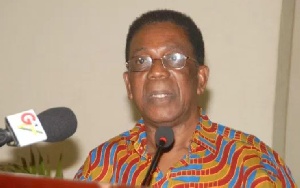 Minister of State in-charge of Tertiary Education, Professor Kwesi Yankah
Minister of State in-charge of Tertiary Education, Professor Kwesi Yankah
Professor Kwesi Yankah, the Minister of State in-charge of Tertiary Education, has called for the harmonisation of higher education in Africa to help promote academics and facilitate professional mobility of staff and students.
Harmonisation of higher education is essentially a process that recognises the significance of regional education cooperation and the importance of establishing an ‘area of knowledge’ in which activities and interactions in higher education, mobility and employment opportunities can be easily facilitated and increased.
“The very nature of a modern day university compels internationalisation. For regardless of location, universities today undertake research in a wide variety of disciplines targeted at issues that transcend local interests and may arouse intellectual curiosity throughout the world,” Prof. Yankah said at the opening of the 2018 African Universities’ Week Celebration in Accra.
He said a harmonised higher education addressed both local and global issues and encouraged the institution of academic curricular that were not static but responsive to changes in global intellectual trends.
The African Universities’ Week Celebration is being organised by the Association of African Universities (AAU) on the theme; “The Africa We Want: The Role of Young People”.
The AAU has, therefore, put together a rich bouquet of events including Chancellors Forum and Round Table, and High Level Panel Discussions on topical issues.
Prof. Yankah noted that local training for global jobs had been the current trend, followed by the process of internationalising course curricular and encouraging cultural diversity.
“Today the prevalence of cultural diversity on campuses is considered an important index of quality and international acceptability,” he said.
Foreign students then have been a key constituency in universities throughout the world making it necessary for institutions to adopt mechanisms by which diverse standards can be measured.
Prof. Yankah said but there was also the issue of partnerships in academic institutions, where institutions from different or similar economic blocks agreed to cooperate in research, teaching and learning for a common good.
“Indeed, internationalisation and partnerships have become an important benchmark in determining a university’s credibility in global domain,” he said.
“Harmonization then cannot be considered as one stop shop. It is only an attempt to approximate the closest equivalences. It is indeed part of a long value chain, and cannot be the single panacea needed to overcome challenges involved in diversity and globalisation.”
Prof. Yankah said harmonisation would be more meaningful under the formation of forums among countries and institutions, where case studies by countries were routinely presented and best practices were noted or adopted to suit local circumstances.
He said equivalencies were then noted to make cooperation easy within international settings and to avoid the existence of uneven standards of weak links in the value chain.
He said that the weak culture of research, statistics and data bases in Africa was a bane to harmonisation, and had often frustrated planning.
Prof. Yankah said one could not wait for a process whereby accreditation bodies among ECOWAS countries were electronically networked to facilitate the retrieval and provision of data in the harmonisation process.
Prof. Etienne Ehouan Ehile, the General Secretary of AAU, said this year’s Week celebration had been innovative by focusing on the youth as reflected by the theme.
“This theme was aptly chosen to bring to the fore, the critical role the youth need to play influencing policy legislative and social changes disrupting the status quo; and taking on a more active role in ensuring we attain the ‘Africa we want’ by 2063,” he said.
“It draws its inspiration from the overall vision for Africa based on the aspirations of the African countries as articulated in the Agenda 2063.”
Prof. Ahmed Mohamed Suleiman, the Vice Chancellor of the University of Khartoum, Sudan, led a delegation of 21 Sudanese vice chancellors to the week-long celebration in Accra.
He said they would continue to strengthen the existing relationship between Sudanese universities and other sister African universities.